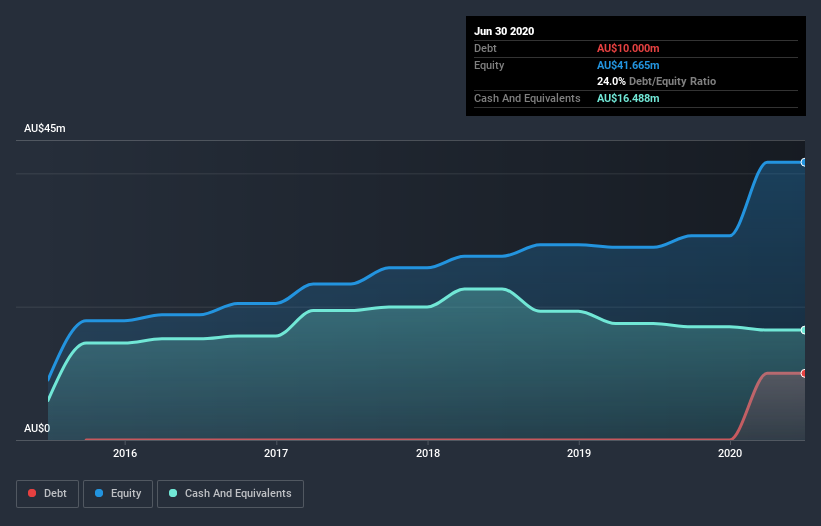Class (ASX:CL1) Has A Pretty Healthy Balance Sheet

Warren Buffett famously said, 'Volatility is far from synonymous with risk.' It's only natural to consider a company's balance sheet when you examine how risky it is, since debt is often involved when a business collapses. Importantly, Class Limited (ASX:CL1) does carry debt. But the real question is whether this debt is making the company risky.
When Is Debt A Problem?
Debt assists a business until the business has trouble paying it off, either with new capital or with free cash flow. Ultimately, if the company can't fulfill its legal obligations to repay debt, shareholders could walk away with nothing. However, a more frequent (but still costly) occurrence is where a company must issue shares at bargain-basement prices, permanently diluting shareholders, just to shore up its balance sheet. Having said that, the most common situation is where a company manages its debt reasonably well - and to its own advantage. The first step when considering a company's debt levels is to consider its cash and debt together.
Check out our latest analysis for Class
What Is Class's Debt?
As you can see below, at the end of June 2020, Class had AU$10.0m of debt, up from none a year ago. Click the image for more detail. However, it does have AU$16.5m in cash offsetting this, leading to net cash of AU$6.49m.
How Strong Is Class's Balance Sheet?
Zooming in on the latest balance sheet data, we can see that Class had liabilities of AU$9.92m due within 12 months and liabilities of AU$12.5m due beyond that. Offsetting these obligations, it had cash of AU$16.5m as well as receivables valued at AU$4.02m due within 12 months. So it has liabilities totalling AU$1.91m more than its cash and near-term receivables, combined.
This state of affairs indicates that Class's balance sheet looks quite solid, as its total liabilities are just about equal to its liquid assets. So while it's hard to imagine that the AU$271.3m company is struggling for cash, we still think it's worth monitoring its balance sheet. While it does have liabilities worth noting, Class also has more cash than debt, so we're pretty confident it can manage its debt safely.
On the other hand, Class's EBIT dived 11%, over the last year. If that rate of decline in earnings continues, the company could find itself in a tight spot. There's no doubt that we learn most about debt from the balance sheet. But ultimately the future profitability of the business will decide if Class can strengthen its balance sheet over time. So if you're focused on the future you can check out this free report showing analyst profit forecasts.
Finally, while the tax-man may adore accounting profits, lenders only accept cold hard cash. Class may have net cash on the balance sheet, but it is still interesting to look at how well the business converts its earnings before interest and tax (EBIT) to free cash flow, because that will influence both its need for, and its capacity to manage debt. Over the most recent three years, Class recorded free cash flow worth 66% of its EBIT, which is around normal, given free cash flow excludes interest and tax. This cold hard cash means it can reduce its debt when it wants to.
Summing up
We could understand if investors are concerned about Class's liabilities, but we can be reassured by the fact it has has net cash of AU$6.49m. The cherry on top was that in converted 66% of that EBIT to free cash flow, bringing in AU$9.0m. So we don't have any problem with Class's use of debt. There's no doubt that we learn most about debt from the balance sheet. But ultimately, every company can contain risks that exist outside of the balance sheet. Case in point: We've spotted 4 warning signs for Class you should be aware of.
Of course, if you're the type of investor who prefers buying stocks without the burden of debt, then don't hesitate to discover our exclusive list of net cash growth stocks, today.
This article by Simply Wall St is general in nature. It does not constitute a recommendation to buy or sell any stock, and does not take account of your objectives, or your financial situation. We aim to bring you long-term focused analysis driven by fundamental data. Note that our analysis may not factor in the latest price-sensitive company announcements or qualitative material. Simply Wall St has no position in any stocks mentioned.
Have feedback on this article? Concerned about the content? Get in touch with us directly. Alternatively, email editorial-team@simplywallst.com.



